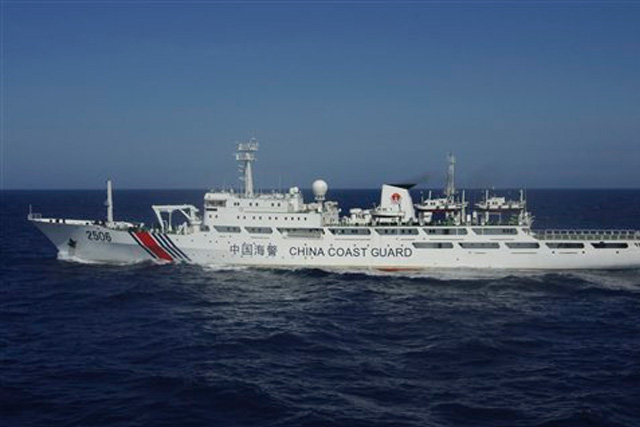By Camille Diola (philstar.com)

China Coast Guard vessel sails in waters 66 kilometers from the East China Sea islands called Senkaku by Japan and Diaoyu by China in July 2013. AP/Japan's 11th Regional Coast Guard
MANILA, Philippines — The highly-contested West Philippine Sea is not covered under China's new law, which expands a 1990 law protecting the Asian power's military and administrative zones, a defense analyst said.
Rommel Banlaoi, chief of the Center for Intelligence and National Security Studies, said that the new Protection of Military Installations law enacted last Friday and expected to take effect on August 1 was passed primarily to keep foreign spies away from Beijing's restricted areas.
The Philippine-claimed area of the South China Sea, although contested by China, has not yet been declared by Xi Jinping's government as a restricted zone, Banlaoi said in an interview over PTV4 on Tuesday.
Read: New Chinese law in disputed waters to take effect Aug. 1
"Sa pagkakaalam ko, kaya pinasa ang batas na 'yan ay dahil sa mga suspected facilities na itinayo sa Hainan Province na ang tingin ng China ay ginagamit ng mga ibang elemento for spying purposes," Banlaoi explained.
The legislation backs plans to strengthen monitoring and establish facilities to further protect military areas from spying.
Banlaoi said that the Philippines should not be worried about the move but should watch if Beijing will use this law to change status quo in the key waterway as it has been doing in recent years.
"Unti-unti kasing gumagawa ang China ng mga hakbang na maliliit pero puwede makapagbago ng mga sitwasyon sa South China Sea," Banlaoi said.
"Kung yung batas na ito ay i-implement lamang sa coastal areas ng China, hindi siya ie-enforce sa disputed areas, wala tayong ipangamba," he added.
China, which has started reclamation work and has built an oil rig in the disputed sea, has been criticized by the United States for violating the multilateral Declaration of Conduct that China and Southeast Asian nations agreed to follow.
Beijing has also deployed civilian and military vessels in contested maritime areas to assert its claims of sovereignty despite opposition from the Philippines, Vietnam and Japan among others.
Read: US: China 'occupying' South China Sea areas, breaking vows
Banlaoi said that once the law is applied to the East China and South China seas amid overlapping claims of its neighbors, the move will affect and endanger the freedom that the Philippines and other rival claimants enjoy in the waters.
"May implication din 'yan sa mga naval powers, at sa mga iba pang vessels private at military vessels na maglalayag sa South China Sea," he said.


No comments:
Post a Comment